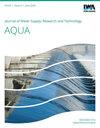突尼斯半干旱区节水灌溉技术对土壤水分流失的评价
IF 4.3
Q2 Environmental Science
引用次数: 0
摘要
在干旱和半干旱地区,管理农业灌溉用水对于应对水资源短缺和最大限度地提高作物产量至关重要。在本研究中,对Manouba地区(突尼斯Medjerda下游河谷)的一种马铃薯作物进行了试验。试验方案包括采用节水灌溉技术的四种水处理:FI(100%全灌):用作物需水量的100%灌溉。DI(灌溉75%):按作物需水量的75%进行亏缺灌溉。PRDRight(右侧灌溉50%):部分根部干燥灌溉。PRDLeft(左侧灌溉50%):部分根部干燥灌溉。利用Hydrus-1D模型对土壤水分剖面进行了模拟。根据试验条件,采用逆建模技术对土壤水力特性进行了标定。结果表明,模拟土壤水分剖面与实测值较为接近。实际上,计算得到的NRMSE值较低,表明Hydrus-1D作为优化灌溉管理决策支持工具的可靠性。然后将这些结果用于研究温度升高2°C对土壤水分流失的影响,并确定其影响不显著。本文章由计算机程序翻译,如有差异,请以英文原文为准。
Evaluation of soil water losses under irrigation saving techniques in a semi-arid region in Tunisia
In arid and semi-arid regions, managing agricultural water for irrigation is essential to cope with water scarcity and maximize crop yields. In this study, an experiment was conducted on a potato crop in the Manouba region (lower valley of Medjerda, Tunisia). The experimental protocol consisted of four water treatments utilizing water-saving irrigation techniques: FI (Full Irrigation 100%): irrigation with 100% of crop water requirements. DI (Irrigation 75%): deficit irrigation with the application of 75% of crop water requirements. PRDRight (Irrigation 50% on the right side): Irrigation by partial root drying. PRDLeft (Irrigation 50% on the left side): Irrigation by partial root drying. Simulation of soil water profiles was carried out by the Hydrus-1D model. The soil hydraulic properties were calibrated according to the experimental conditions using an inverse modeling technique. According to the obtained results, simulated soil water profiles were close to those measured. Indeed, the calculated NRMSE values are low, indicating the reliability of Hydrus-1D as a decision support tool to optimize water irrigation management. These results were then used to investigate the effects of a 2 °C temperature increase on soil water loss, and it was determined that the impact was insignificant.
求助全文
通过发布文献求助,成功后即可免费获取论文全文。
去求助
来源期刊
CiteScore
4.70
自引率
0.00%
发文量
74
审稿时长
4.5 months
期刊介绍:
Journal of Water Supply: Research and Technology - Aqua publishes peer-reviewed scientific & technical, review, and practical/ operational papers dealing with research and development in water supply technology and management, including economics, training and public relations on a national and international level.

 求助内容:
求助内容: 应助结果提醒方式:
应助结果提醒方式:


